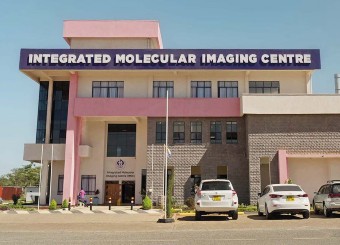Parkinson’s disease is the fastest growing neurological condition in the world and affects more than 145,000 people in the UK. There is still no cure. Our understanding of the condition, however, is expanding, and through the research of Perdita Barran, Professor of Mass Spectrometry at the Manchester Institute of Biotechnology, and the unique abilities of Joy Milne – the ‘super-smeller’ – early diagnosis is more likely than ever before.
The ‘nose to diagnose’ story began several years ago when Perdita received a phone call from her colleague, Professor Tilo Kunath, at The University of Edinburgh saying he had met a woman who could smell Parkinson’s. Intrigued, Perdita contacted Joy, a retired nurse, and quickly realised the potential of her gift. This was the start of a long-standing collaboration between the two, leading to a raft of firsts in disease diagnostics.
Sensory superpowers
Joy realised from an early age that she could smell things other people couldn’t. This is due to hereditary hyperosmia – a heightened sense of smell. Day-to-day this sensitivity can be a burden, but during Joy’s career as a nurse, it became an advantage. She could differentiate between illnesses by smell, usually from patients’ biofluids. Her ability to notice a change in odour and its link to disease was brought home when she noticed a change in her husband, Les’ smell. He was later diagnosed with Parkinson’s and Joy realised the smell was common to all people with the condition.
Perdita knew that Joy’s claim needed to be tested. Together with Professor Kunath, they conducted a study where they asked people with and without the condition to wear t-shirts before returning them to the lab for testing. Joy sniffed each of the t-shirts and not only did she correctly identify all of the subjects with Parkinson’s, she also identified a participant in the control group who was later diagnosed.
Our expertise and facilities at Manchester allow us to explore new avenues in disease diagnostics, which help us to improve the lives of people all around the world.
The answer’s in the details
Following this initial study, Perdita turned to science to understand what was causing this difference in smell. In collaboration with Professor Monty Silverdale, a Consultant Neurologist, she conducted a clinical trial, funded by Parkinson’s UK and the Michael J. Fox Foundation. Replacing t-shirts with gauze and cotton buds, they sent packs to neurology clinics all over the UK to gather samples. The samples were then analysed using mass spectrometry – a technique that separates and weighs each of the molecules present on the swab. By combining this data with Joy’s abilities, Perdita was able to identify the molecules, or biomarkers, responsible for the smell.
Looking for biomarkers of disease isn’t new; it is a well-established diagnostic tool. However, most diagnostic tests require a blood sample. Where Perdita’s work differs, and what makes this exciting for clinical application, is that she analysed sebum.
Sebum is an oily substance excreted by the skin to help protect and moisturise it. Relative to blood and other biofluids, it is understudied for its diagnostic potential. Blood, if it is to be used in a mass spectrometer, must be frozen within four hours of extraction and stored at very low temperatures. Sebum, however, can be stored at room temperature and collected via a simple swab with a cotton bud.
An NHS first
With the biomarkers identified and a robust collection method in place, the next step for Perdita and the team was to develop a test for use in a clinical setting. Their lab-based method can produce a result in less than five minutes, which could help speed up the diagnostic triaging procedure. Mass spectrometry is used in hospitals all over the world, (for example, to screen newborn infants for metabolic disorders) and Perdita is working with the NHS to develop a test that they hope to make available in the next two years.
If successful, this simple test could significantly change the prognosis for Parkinson’s. Currently, a person with suspected Parkinson’s can only be diagnosed by a neurologist, with wait times months-to-years long. If a GP or other primary care staff could request a diagnostic swab test, they could quickly identify those with high levels of biomarkers and prioritise them for testing.
A marriage of science and medicine
Despite there being no current cure for Parkinson’s, if identified early, there are ways to slow symptom progression. Often treatments are simple lifestyle and dietary changes, and the need for medication is reserved for the later stages of the condition.
This groundbreaking work is the perfect marriage of lived experience and academic research, coupled with clinical expertise. It highlights the importance of collaborating with people across different disciplines, combining perspectives and knowledge. By working together in this way, we can better enhance our understanding of a problem, find new ways to address it and, in turn, improve the lives of millions around the world.
Discover more about the University's transformative research.

.jpg)



